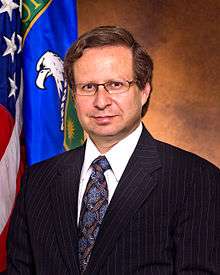Steven E. Koonin
| Steven E. Koonin | |
|---|---|
 Official portrait of Steve Koonin | |
| Director of the Center for Urban Science and Progress, New York University | |
|
Assumed office April 2012 | |
| 2nd Under Secretary of Energy for Science | |
|
In office May 2009 – November 2011 | |
| President | Barack Obama |
| Preceded by | Raymond L. Orbach |
| 7th Provost of Caltech | |
|
In office February 1995 – March 2004 | |
| Preceded by | Paul C. Jennings |
| Succeeded by | Edward Stolper (acting) |
| Personal details | |
| Born |
December 12, 1951 Brooklyn, New York, United States |
| Spouse(s) | Laurie Koonin |
| Children | 3 |
| Alma mater |
B.S., California Institute of Technology Ph.D., Massachusetts Institute of Technology |
Steven E. Koonin (born December 12, 1951)[1] is a theoretical physicist and Director of the Center for Urban Science and Progress at New York University.
Biography
Koonin received his Bachelor of Science from Caltech and his Ph.D. from the Massachusetts Institute of Technology.[2] In 1975, Koonin joined the faculty of the California Institute of Technology as a Professor of Theoretical Physics, and served as the Institute's provost from 1995 to 2004.[3] In 2004, Koonin joined BP as their Chief Scientist where he was responsible for guiding the company’s long-range technology strategy, particularly in alternative and renewable energy sources.[4] In 2009, he was appointed the U.S. Department of Energy’s second Senate-confirmed Under Secretary for Science serving from May 19, 2009 through November 18, 2011.[5] He left that post in November 2011 for a position at the Institute for Defense Analyses. On April 23, 2012, Koonin was named director of NYU's Center for Urban Science and Progress (CUSP).[6]
He has served on numerous advisory bodies for the National Science Foundation, the Department of Defense, and the Department of Energy and its various national laboratories, such as the JASON defense advisory group, which he has chaired.[7] Koonin's research interests have included theoretical nuclear, many-body, and computational physics, nuclear astrophysics, and global environmental science.[8]
Views on climate science
In "Climate Science Is Not Settled," a 2014 essay published in the Wall Street Journal, Koonin wrote that "We are very far from the knowledge needed to make good climate policy," and that "The impact today of human activity [on climate] appears to be comparable to the intrinsic, natural variability of the climate system itself." Koonin criticized the use of results from climate modelling to support the "scientific consensus" (quotes in original) about climate change, noting that, among other problems, "The models differ in their descriptions of the past century's global average surface temperature by more than three times the entire warming recorded during that time." Regarding climate sensitivity, Koonin wrote that "Today's best estimate of the sensitivity (between 2.7 degrees Fahrenheit and 8.1 degrees Fahrenheit) is no different, and no more certain, than it was 30 years ago. And this is despite an heroic research effort costing billions of dollars."[9]
Ten days after Koonin wrote this, Jeffry Klugor in Time [10] called Koonin's piece disingenuous if not dishonest. Koonin simply used the old debating trick of setting up a strawman to knock down by misconstruing what climate scientists mean when they say the climate debate is "settled." "...they mean that the fake debate over whether climate change is a vast hoax is finished," writes Klugor. He goes on to state that every point Koonin made is and has for years been widely acknowledged by climate scientists, very few of whom utilize the kind of overzealous language their critics commonly use. However, Klugor misquotes Koonin in an attempt to discredit his comments. Koonin's exact comment in the opening sentence of his editorial reads "The idea that 'Climate science is settled' runs through today's popular and policy discussions." He does not state that any "climate scientists" have explicitly claimed that "the science is settled", he seems to be merely his opinion that this phrase and sentiment it connotes are often pervasive in political and policy-making discussions surrounding climate change.[11]
Bibliography
- Computational Physics, Fortran version, ISBN 978-0-201-38623-3
References
- ↑ "Steven Koonin". Array of Contemporary American Physicists. American Institute of Physics. Retrieved 20 September 2014.
- ↑ http://web.mit.edu/newsoffice/2010/hottel-koonin-0923.html
- ↑ http://www.caltech.edu/content/former-caltech-provost-steven-koonin-nominated-under-secretary-science
- ↑ http://www.earth.columbia.edu/sop2006/bios/koonin_s.html
- ↑ Energy.gov: "Dr. Steven E. Koonin - Director - NYU's Center for Urban Science & Progress and Former Under Secretary for Science" retrieved October 20, 2013
- ↑ http://cusp.nyu.edu/about-us/
- ↑ "Steven Koonin". Department of Energy.
- ↑ http://www.pma.caltech.edu/PhysColl/biographies/people/koonin_steven.html
- ↑ Climate Science Is Not Settled by Steven E. Koonin, Wall Street Journal, Sept. 19, 2014
- ↑ (http://time.com/3445231/climate-denier-settled-science/)
- ↑ (http://www.wsj.com/articles/climate-science-is-not-settled-1411143565)
|